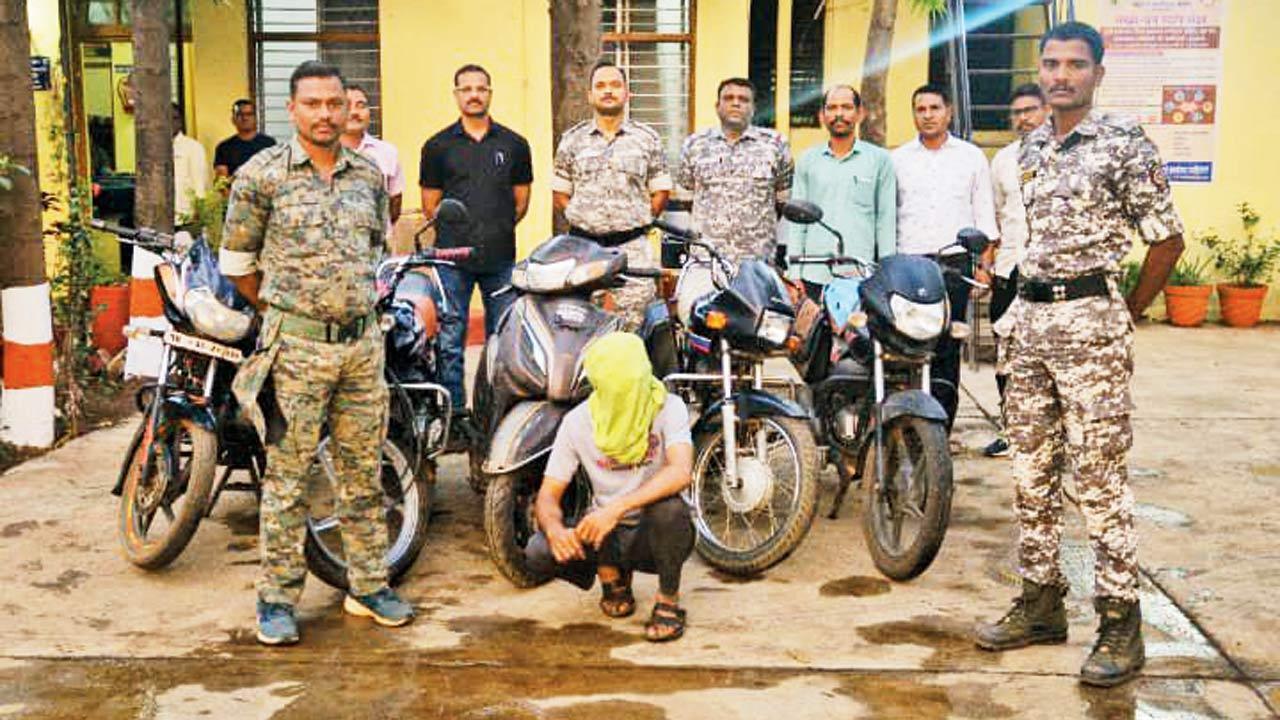Forest officials arrest accused during night patrol; two others flee; according to forest department officials, the arrested accused has been identified as Chaitya Mokashi, a resident of the Chinchoti area near Tungareshwar Wildlife Sanctuary

Forest officials with the arrested accused
During a recent patrol at Tungareshwar Wildlife Sanctuary, around 60 km to the north of Mumbai, forest department officials arrested an individual in possession of chopped grey langur remains. Investigations revealed that the langur was killed for consumption.
Range Forest Officer (RFO) Rajeshree Salve from Tungareshwar Wildlife Sanctuary said, “On February 2, night around 10.15 pm, our forest department staff were conducting night foot patrols near Palhar Lake at Tungareshwar Wildlife Sanctuary when they spotted three people walking through the forest. One of them was carrying a bag, which raised suspicion. When our staff approached them, two of the individuals fled. Upon checking the bag, our staff found pieces of meat inside. During interrogation, the accused confessed to killing a langur and intending to cook its meat.”
The officials have sent meat samples to a forensic lab in Nagpur for further testing.
“The accused has been booked under various sections of the Wildlife Protection Act, 1972, including poaching a wild animal. He was produced before the local court on Monday and was remanded to forest custody. The forest department is actively searching for the two absconding accused, who are residents of a nearby village,” Salve added.
According to forest department officials, the arrested accused has been identified as Chaitya Mokashi, a resident of the Chinchoti area near Tungareshwar Wildlife Sanctuary. The two absconding accused have been identified as Deepak Mokashi and Chintu Baswat.
The grey langur is protected under Schedule II of the Wildlife (Protection) Act, 1972, making its trade illegal. Possession of wild animals such as langurs can result in legal action, as capturing or keeping them in captivity is punishable by up to three years in prison, a fine of up to R1 lakh, or both. Under the Prevention of Cruelty to Animals (PCA) Act, the exhibition or training of monkeys as performing animals is also banned.
Wildlife Conservationist Kedar Gore from the Corbett Foundation said, “Hunting of wildlife, though illegal, is unfortunately quite common across India, including Maharashtra. The Corbett Foundation’s biodiversity survey in Thane Forest Division has captured instances of bushmeat hunters illegally entering forests to hunt wild animals.
It must be thoroughly investigated whether the person caught in Tungareshwar Wildlife Sanctuary with langur meat had specifically targeted the langur or if it was a by-product of a hunt planned for another threatened species. The frontline forest department staff have done commendable work, but stronger patrolling, increased vigilance, and greater awareness among nearby villagers are essential to prevent hunting altogether.”
Honorary Wildlife Warden of Thane and President of NGO RAWW, Pawan Sharma, said, “Langurs are protected under Schedule II of the Wildlife Protection Act, 1972, which strictly prohibits their hunting.
Wild animal meat is in demand in local markets for self-consumption by people living near forest areas and is also supplied to the elite class for easy money. Entering protected forest areas without permission is considered trespassing. Killing any protected species, or even an unsuccessful attempt, is legally classified as hunting under the Act.”
 Subscribe today by clicking the link and stay updated with the latest news!" Click here!
Subscribe today by clicking the link and stay updated with the latest news!" Click here!










